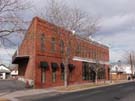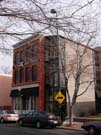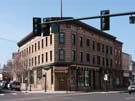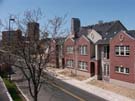By Andrea Juarez
Photos by Bernard Grant
Their modesty is part of their allure.
To those not in the know, they are the friendly folks picking up trash, removing graffiti, and shoveling snow along Washington Street in Denver’s Five Points neighborhood. For those in the know, there is admiration in seeing Sheila King and Carl Bourgeois perform these unglamorous tasks since they own Civil Technology, Inc., a successful business at the forefront of Five Points’ revitalization. 
“We’re hands on people,” said King. “We’re involved in all facets of the business.”
Last month, Civil Technology, a construction management and real estate development company, was one of six businesses and individuals honored at the 22nd Annual Martin Luther King, Jr. Business Social Responsibility Awards Luncheon. When asked about the award – or any of the other plaques and statutes that decorate Civil Technology’s conference room – neither King nor Bourgeois boast. King humbly said, “It’s just what we do.”
Civil Technology was selected because “they have been a leader in development,” said Wellington Webb, former Denver mayor and current president of the Colorado Black Chamber of Commerce. “They started from scratch and have proved through time to have a strong work ethic, tenacity and integrity. They built a firm for the 21st century that Dr. King would have been extremely proud of.”
Civil Technology has 30 employees, of whom approximately 60 percent are people of color and women, and most have grown with the company.
“At Civil Technology, we’re actually more like a family. We want to be good citizens,” King said. “I’m proud of the company and all its work. Our goals are to work with best practices, high standards, a commitment to employees and to our clients.”
In addition to its work in Five Points, Civil Technology has worked on some of Denver’s most prestigious construction projects, partnering with major construction firms such as Mortensen and DMJM Aviation for work on the Denver International Airport, Stapleton redevelopment, Denver Justice Center, Wellington Webb Office Building, and Denver Union Station. But Bourgeois admitted his “soft-spot” is for the work he and King are doing in Five Points.
Marva Coleman, former director of the Five Points Business Association, credited the pair with leading the neighborhood’s rebirth. “Carl had great foresight and Sheila brought stability. They have made a tremendous impact on Five Points.”
The Evolution Of CIVIL TECHNOLOGY
While Bourgeois was working in the banking industry, his interest in Five Points was peaked.
“I became aware of the discrepancies in the valuation of properties in urban or traditional African American or Hispanic communities versus how majority communities were valued,” he said. “Five Points was one of many areas that lost its identity. During segregation, the area was thriving but then came its low point, particularly during the 1960s through 80s.”
Bourgeois, 56, born and raised in Colorado Springs, saw opportunity. He left his job in 1983, and he and two friends Killian Ikwuakor and Edwin Smith closed the deal on their first commercial property – the Triangle Building at 2413 Washington St.
“It’s an 1887 structure and at one time housed an ice and coal store,” Bourgeois said. “Hay was sold out of it, and it also had boarding rooms upstairs; but, after the 1950s, the property sat vacant and was boarded up.”
As Bourgeois, Ikwuakor and Smith worked on gutting the building, they were often met with discouragement.
“I was told that we couldn’t have glass windows in Five Points and we needed bars on the windows.” Bourgeois said. “Sometimes they just said grass was not going to grow in this neighborhood. We’re still here.”
Coleman said she admires Bourgeois’ fortitude.
“When Carl was working on the Triangle Building, I told him it was impossible and he told me, ‘just watch me.’ He said it and it came to fruition,” she said. “Then soon after, I received an invitation from [former Denver mayor Federico] Peña, inviting me to a building opening. When I drove up and saw the Triangle Building, I cried. Carl got me interested in Five Points and helping the neighborhood.”
The renovation was completed in 1985. Today the property is home to Civil Technology.
“Even after the building was restored, there were other difficulties and realities to face. Every other building on the block was boarded up,” Bourgeois said. “I had difficulty finding tenants because the rest of the surrounding area was still blighted. I knew then that there was a need to do more on the block.”
In 1986, the partners acquired a second property at 2444 Washington St. In its former life, it was the after-hours Climax Club but had become condemned after a fire. “When we bought it, it was a disaster. There was no roof, no floors, no interior walls,” Bourgeois said. “And it was still overpriced.”
In 1988 the reconstruction was complete. The building was remodeled into an office building and renamed the Commonwealth Building. Bourgeois bought out his former partners and in 19 89 founded Civil Technology. 89 founded Civil Technology.
About this time, King, originally from New York, moved to Denver for a job as a computer programmer. She learned about the work Civil Technology was doing in Five Points and thought the business had potential. In 1991 she began working for Civil Technology, taking a lead with the business’ administration and management. In 1993, she purchased the company and Bourgeois assumed the role of business manager.
“Sheila is an incredible administrator,” Bourgeois said. “There’s nothing she won’t do or try to do for the company. She should be cloned.”
Together, Bourgeois and King have redeveloped several properties along the 24th and Washington Street corridor. Some of these projects include the King Stroud Building (the Denver Urban Spectrum building) at 2499 Washington St., Kimbal Hall at 700 E. 24th Ave. and most recently, King’s Island at E. 24th Ave. and Washington St.
Kimbal Hall was transformed from a garage for cabs into a “community resource space.” It is home to several Black non-profits and has also become a place to hold community events and receptions. In 2006, more than 500 events were held in the building’s 2,000 square foot lobby.
“Carl and Sheila are notoriously humble, unpretentious, and go quietly about their work,” said Cheryl Armstrong, president & CEO of the James P. Beckwourth Mountain Club and a Kimbal Hall tenant. “They are exemplary people operating a successful business that fosters civic responsibility and community involvement.”
“Some projects, such as Kimbal Hall, were developed with an eye toward the community,” said James Ellis, senior associate of Civil Technology whose responsibilities include operations oversight.
Bourgeois said he has not acquired any of the Five Points properties from African Americans. Nearly all the properties have been purchased from white investors, some from out of state.
 “The people I bought from had no interest in developing them, they were waiting to be bought out,” Bourgeois said. “Their motivation was that some day they will sell and make a substantial profit.” “The people I bought from had no interest in developing them, they were waiting to be bought out,” Bourgeois said. “Their motivation was that some day they will sell and make a substantial profit.”
Future CIVIL TECHNOLOGY Projects
Ellis is excited about two new projects in the queue. He said the first is certain to put Five Points on the map locally, regionally and nationally, while the second project has a community value that is immeasurable. Civil Technology will redevelop the historic Rossonian Hotel, a legendary jazz venue from the 1930s and 40s. It attracted jazz greats such as Ella Fitzgerald and Louis Armstrong during segregation. The facade of the Rossonian will remain basically the same, and the majority of the work will be done to the interior. The structure will be restored as a jazz venue and will also include an upscale restaurant. The project is expected to be complete by the summer of 2008.
“Less than a year ago we closed the deal on the Rossonian Hotel and we’re ready to move forward on the project,” Bourgeois said. “We will restore the facility to retain the history, tradition, character and culture. It will be a place where all are welcome.”
Of historical significance to Five Points is Bourgeois’ effort to create an African American firefighter museum at 2563 Glenarm Pl., the site of Denver’s first Black fire station (Fire Station No. 3). Currently, he is in negotiations with the property owner and tenants.
“We’re excited about the possible opportunity to restore the building,” he said. “It has so much history because it was central to the Black community during segregation. A lot of people want to see this project happen.”
Ellis and Bourgeois said many real estate developers probably  would not think they were a good business model, because bringing in the biggest dollar for their projects has not always been their primary motivation. would not think they were a good business model, because bringing in the biggest dollar for their projects has not always been their primary motivation.
“We’re not just here for value,” Bourgeois said. “We’re here for community building.”
|
